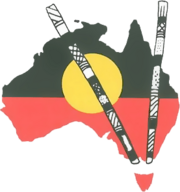Aboriginal Provisional Government facts for kids

Aboriginal Provisional Government logo
|
|
| Abbreviation | APG |
|---|---|
| Formation | 1990 |
| Type | Aboriginal organisation |
| Legal status | Active |
| Purpose | Advocate and public voice, educator and network |
| Headquarters | Tasmania, Australia |
|
Region served
|
Australia |
|
Official language
|
English |
| Website | Aboriginal Provisional Government |
The Aboriginal Provisional Government (APG) is a group in Australia that works for the independence of Indigenous Australians. They believe Aboriginal people should have more control over their own lives and futures.
Contents
History of the APG
Early Ideas for an Aboriginal Government
The idea for an Aboriginal government started in 1990. Some Aboriginal leaders from the Federation of Land Councils met in the Northern Territory. They felt that Aboriginal issues needed a stronger voice beyond just land rights.
They wanted a new group that would help Aboriginal people move from being controlled by the Australian government to having their own national government. The word "Provisional" meant it was a temporary step. It was not meant to govern people directly. Instead, it was a way to push for self-determination. This means Aboriginal people deciding their own future.
Some of the first members of the APG included Bob Weatherall, Josie Crawshaw, Geoff Clark, Clarrie Isaacs, Michael Mansell, Robbie Thorpe, Kathy Craigie, and Lyall Munro Jnr.
Influences on the APG's Vision
Early Aboriginal activists like Charles Perkins inspired younger APG members. Perkins was known for his "freedom rides" in New South Wales. He also openly challenged politicians.
The APG's ideas about moving away from relying on the Australian government came from many sources. These included writings like Kevin Gilbert's "Treaty 88". Poems by Oodgeroo Noonuccal and Jack Davis also played a part. Legal cases, such as Paul Coe's fight for Aboriginal sovereignty in Coe v Commonwealth in 1978, also shaped their thinking.
Forming the APG and Its Actions
News about the APG spread quickly. The group first announced its formation publicly in Sydney in 1990. In 1992, the APG held a national meeting in Hobart, Tasmania. There, they created an Elders Council, led by Joe McGuiness from Queensland.
The APG issues its own Aboriginal passports and birth certificates. These passports help young Aboriginal people show their national identity. The birth certificates mean Aboriginal children do not have to be registered with the Australian government. A famous Aboriginal poet, Jack Davis, allowed the APG to use part of his poem on their official letters.
The Australian government did not want to work with the APG at first. This was because the APG said they would only meet government-to-government. They did not want to be seen as just another lobby group.
However, some APG members eventually met with Prime Minister Paul Keating. This meeting was about new laws for native title. Michael Mansell had been involved in earlier talks about native title. He was chosen by a large Aboriginal meeting to protect the gains made in the Mabo High Court case.
Mansell later refused to sign the final native title laws with Keating. He felt the laws were unfair because they only affected Aboriginal native title. They left non-Aboriginal land interests untouched. He believed this was similar to an earlier unfair law that the High Court had stopped. To get around this, the government temporarily stopped a law that prevents racial discrimination.
Geoff Clark, who was Deputy Chair of the APG, later became the head of ATSIC. ATSIC was a government body for Aboriginal and Torres Strait Islander people. Clark pushed for a treaty within ATSIC and many supported him. His board started a Treaty committee and published a document called 'Let's Treaty Now'.
When John Howard became Prime Minister, he made it harder for Aboriginal people to get native title. He also closed down ATSIC. Because of this, the idea of a treaty was put on hold.
The APG has published four books. These books cover topics like Aboriginal Government, their national conference, the Australian Constitution, and the Mabo case.
What the APG Believes
The APG believes that Aboriginal people were a sovereign people before Europeans arrived in 1788. They argue that this status has not changed. They believe that because they are a distinct people, Aboriginal and Torres Strait Islander people have the right to self-determination. This means they can choose their own future. They believe they can be equal with other nations, not just citizens of Australia.
The APG understands that different groups might choose different paths. These could include fitting into Australian society, managing their own affairs, or even forming a completely independent Aboriginal government. They believe that international law allows Aboriginal people to choose to work with Australia or be politically independent.
The APG encourages Aboriginal groups to use programs like reconciliation, land rights, and native title. However, they want people to remember their larger rights beyond just welfare. The APG strongly opposes Aboriginal advisory bodies. They believe that white politicians should not decide the future of Aboriginal people, no matter who advises them.
The APG rejected suggested changes to the Australian Constitution proposed by Julia Gillard and an expert panel. They felt these suggestions promoted white superiority. For example, they suggested English should be the official language, but in New Zealand, Maori is also an official language. The suggestions also did not mention Aboriginal sovereignty at all. The APG wants the Constitution to say: "Aborigines and Torres Strait Islanders have the right to self determination."
See also
- Aboriginal Tent Embassy (started 1972)
- Australian Indigenous Sovereignty
- Murrawarri Republic (started 2013)
 | William M. Jackson |
 | Juan E. Gilbert |
 | Neil deGrasse Tyson |

